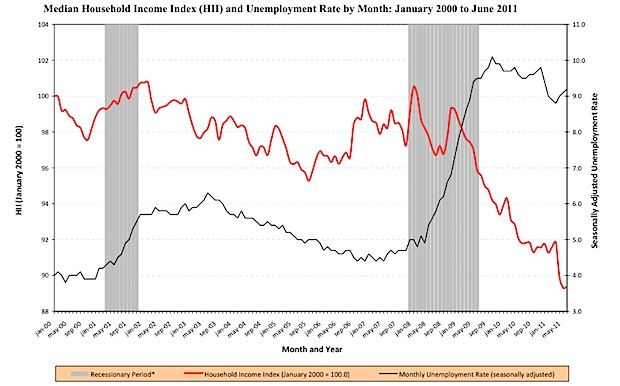The big lie about the Keystone XL pipeline (outside of the corruption and devastating impact on the environment) is that it will create jobs and reduce U.S. dependence on foreign (read angry middle eastern brown people) oil.
The facts are that far from the pitiful 20,000 jobs promised independent economists estimate a mere 6,000 and that instead of lowering energy prices in the U.S., most of the Tar Sand output is destined for shipment to China and other developing countries.
Of the 5 oil giants involved in the project, 5 are not based in the U.S. and the 6th, Valero, is primarily an exporting firm.
Say No to the Keystone XL
The Editors of The New York Times
Published: October 2, 2011
(T)he State Department appears to be more persuaded by proponents who claim that the pipeline will help reduce America’s dependence on oil from politically troubled sources in the Middle East. We are skeptical about that, too.
What pipeline advocates – including big-oil lobbyists and House Republicans who have tried to force an early, favorable decision – fail to mention is that much of the tar sands oil that would be refined on the Gulf Coast is destined for export. Six companies have already contracted for three-quarters of the oil. Five are foreign, and the business model of the one American company – Valero – is geared toward export.
…
We have considerable sympathy for one argument: that construction of the pipeline would bring jobs at a time of great economic uncertainty. TransCanada has said the 2,000-mile line would create 20,000 jobs in the United States. The State Department concludes that the real number may be closer to 6,000 jobs.
Environment, Size of U.S. Oil Exports Part of Keystone XL Pipeline Debate
By Lyudmila Tsubiks, infoZine
Wednesday, September 28, 2011
Much of the fuel refined from the proposed Keystone XL pipeline’s heavy crude oil will never reach U.S. drivers’ tanks, a new report says.
The oil will be refined into diesel and exported, Lorne Stockman, research director of Oil Change International, said. His group opposes the pipeline.
According to the report, the crude will be delivered from Hardisty, Alberta, by the 1,980-mile, 36-inch diameter Keystone XL pipeline to refiners in Texas that are focused on exports.
“Europe has a diesel deficit, Latin America has a petroleum product deficit generally and we are increasing exporting our surplus to these countries,” Stockman said.
The key quality here is Fungibility–
Fungibility is the property of a good or a commodity whose individual units are capable of mutual substitution, such as crude oil, wheat, precious metals or currencies. For example, if someone lends another person a $10 bill, it does not matter if they are given back the same $10 bill or a different one, since currency is fungible; if someone lends another person their car, however, they would not expect to be given back a different car, even of the same make and model, as cars are not fungible.
And this applies to all the ‘Drill baby, drill’ arguments. U.S. demand for energy has plummeted because our economy sucks and so much of our production is being sold offshore.
Dominion seeks exports of Marcellus Shale gas
Associated Press
OCTOBER 9, 2011, 5:27 P.M. ET
HARRISBURG, Pa. – An energy company is seeking federal approval to allow exports of liquefied natural gas from the booming Appalachian drilling industry, saying that the nation’s natural gas supply is outpacing demand.
Richmond, Va.-based Dominion Resources Inc. announced last week that it has applied to the Department of Energy to allow 1 billion cubic feet per day to be exported through a terminal it owns in Maryland. The application, filed Sept. 1, seeks permission for the exports of liquefied natural gas to any country with which the United States does not prohibit trade, the company said.
…
“It is in our nation’s best interests to develop our natural resources responsibly and reliably,” Farrell said. “In the process, we will be able to improve the nation’s balance of trade.”
So basically we’re being asked to ruin our environment, kill ourselves with pollution, and give away our natural resources so that greedy energy companies can steal more of our money.


 The Mary Rose was a carrack-type warship of the English Tudor navy of King Henry VIII. After serving for 33 years in several wars against France, Scotland, and Brittany and after being substantially rebuilt in 1536, she saw her last action on 19 July 1545. While leading the attack on the galleys of a French invasion fleet, she sank in the Solent, the straits north of the Isle of Wight. The wreck of the Mary Rose was rediscovered in 1971 and salvaged in 1982 by the Mary Rose Trust in one of the most complex and expensive projects in the history of maritime archaeology. The surviving section of the ship and thousands of recovered artefacts are of immeasurable value as a Tudor-era time capsule.
The Mary Rose was a carrack-type warship of the English Tudor navy of King Henry VIII. After serving for 33 years in several wars against France, Scotland, and Brittany and after being substantially rebuilt in 1536, she saw her last action on 19 July 1545. While leading the attack on the galleys of a French invasion fleet, she sank in the Solent, the straits north of the Isle of Wight. The wreck of the Mary Rose was rediscovered in 1971 and salvaged in 1982 by the Mary Rose Trust in one of the most complex and expensive projects in the history of maritime archaeology. The surviving section of the ship and thousands of recovered artefacts are of immeasurable value as a Tudor-era time capsule.
Recent Comments